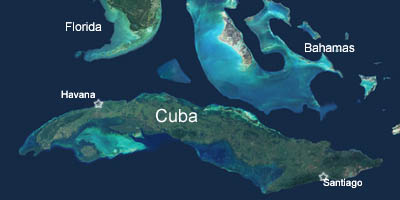I was in Argentina as the U.S. prepared to invade Iraq. Many people I met strongly disagreed with American foreign policy. They criticized America's greed for both oil and power. The international threat that Sadaam posed was so ambiguous that I wanted to believe that a moral justification for the war existed. In my country's defense, I argued that removing Sadaam would end the suffering of the Iraqi people. But were the Iraqi people really suffering? Were they suffering more than the starving children in rural Argentina? Perhaps Iraqis merely lacked the luxuries that the First World enjoys. I wished I knew first hand whether the Iraqis themselves were desperate for a foreign invasion.
Shortly after the U.S. military ousted Sadaam's regime, I saw a Uruguayan newspaper headline that asked "Is Latin America next?" We all know that the end of the Cold War did not end rumors of a Cuban invasion. The U.S. has facilitated the prevention or destruction of so many communist governments; is it not surprising that communism has survived for so many years in Cuba? After all, it is an island just a day’s boat ride from our own borders. A close friend in Buenos Aires feared at the time that President Bush would use the successful campaign in Iraq to gather rapid support for removing Fidel Castro. After all, he owed a favor to the Cuban exile community that got him elected. As human rights groups recharged their efforts to exploit barefooted children in Cuba, I began to feel that a U.S. invasion was eminent. I wanted to know if it was necessary. I wanted to see if Cubans were suffering.
April 2003; after six and a half months in South America, I was finally headed home but not without a 16 day layover in Cuba.
For those whose curiosity impels them to read on, this is a work in progress and I would truly appreciate hearing your reaction and/or criticism.
